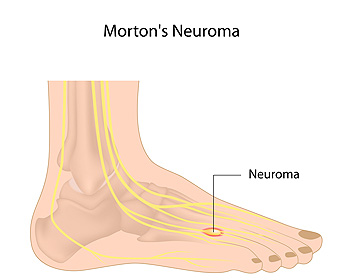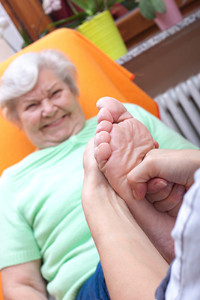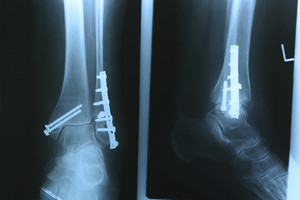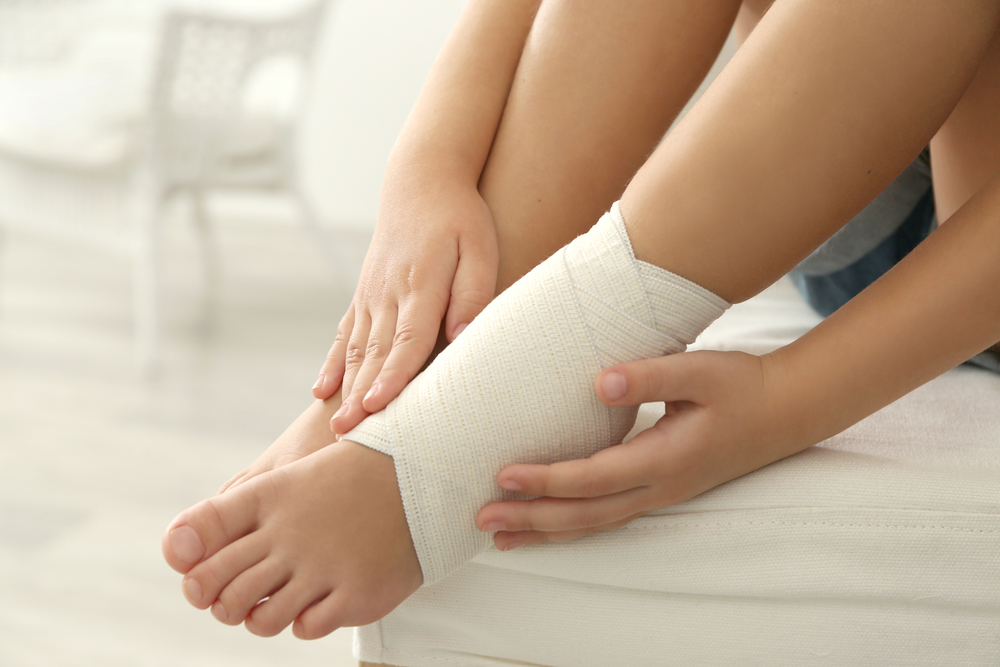June 2021
Nerve Growth and Morton’s Neuroma
 Nerve tissue is often affected due to Morton’s neuroma. Growths can form on the tissue, and may cause pressure, pain, and discomfort. Many patients liken the sensation to having a pebble in the shoe, and some people feel a burning or numbing sensation. This condition can develop from repetitive overuse while performing specific sporting activities, or it may come from wearing shoes that do not fit correctly. Additionally, people who have hammertoes, bunions, or flat feet may be prone to developing Morton’s neuroma. Prompt treatment should begin in order to lessen existing pain. It is important to have a proper diagnosis made, which is generally done by having an X-ray, ultrasound, or MRI performed. Relief can be found when shoes that are worn fit properly, in addition to wearing custom made orthotics. There are several treatment options available for Morton’s neuroma, and it is suggested that you consult with a podiatrist who can determine what the best one is for you.
Nerve tissue is often affected due to Morton’s neuroma. Growths can form on the tissue, and may cause pressure, pain, and discomfort. Many patients liken the sensation to having a pebble in the shoe, and some people feel a burning or numbing sensation. This condition can develop from repetitive overuse while performing specific sporting activities, or it may come from wearing shoes that do not fit correctly. Additionally, people who have hammertoes, bunions, or flat feet may be prone to developing Morton’s neuroma. Prompt treatment should begin in order to lessen existing pain. It is important to have a proper diagnosis made, which is generally done by having an X-ray, ultrasound, or MRI performed. Relief can be found when shoes that are worn fit properly, in addition to wearing custom made orthotics. There are several treatment options available for Morton’s neuroma, and it is suggested that you consult with a podiatrist who can determine what the best one is for you.
Morton’s neuroma is a very uncomfortable condition to live with. If you think you have Morton’s neuroma, contact Naim G. Shaheed, DPM of Ankle and Foot Centers of Georgia. Our doctor will attend to all of your foot care needs and answer any of your related questions.
Morton’s Neuroma
Morton's neuroma is a painful foot condition that commonly affects the areas between the second and third or third and fourth toe, although other areas of the foot are also susceptible. Morton’s neuroma is caused by an inflamed nerve in the foot that is being squeezed and aggravated by surrounding bones.
What Increases the Chances of Having Morton’s Neuroma?
- Ill-fitting high heels or shoes that add pressure to the toe or foot
- Jogging, running or any sport that involves constant impact to the foot
- Flat feet, bunions, and any other foot deformities
Morton’s neuroma is a very treatable condition. Orthotics and shoe inserts can often be used to alleviate the pain on the forefront of the feet. In more severe cases, corticosteroids can also be prescribed. In order to figure out the best treatment for your neuroma, it’s recommended to seek the care of a podiatrist who can diagnose your condition and provide different treatment options.
If you have any questions, please feel free to contact one of our offices located in Lithonia/Stonecrest and Emory/Midtown, GA . We offer the newest diagnostic and treatment technologies for all your foot care needs.
Why Older Adults Need to Take Care Of Their Feet
Foot conditions in older adults are quite common. Poor foot health increases an elderly person’s risk of falling and can negatively affect their quality of life. The foot conditions that affect senior citizens can be caused by degradations in foot and ankle skin and structure, poor circulation, systemic disorders, and more. Regular foot care is very important for the elderly person, and if they are unable to properly attend to their own feet, a caretaker or loved one should do it. Feet should be kept clean and checked regularly to spot any changes. An older person should never be barefoot, their toenails should be trimmed regularly, and their socks should keep moisture away from their skin and not be too tight around the ankles. Feet should be measured every time they purchase shoes to ensure proper fit and account for feet spreading and changing with age. Shoes should offer support in the heel and arch and high heels should be avoided. Additionally, getting their feet examined by a podiatrist would be beneficial to address any foot pain they may be experiencing, and to also be fitted with custom orthotics to help correct alignment and stride issues to improve stability and comfort.
Proper foot care is something many older adults forget to consider. If you have any concerns about your feet and ankles, contact Naim G. Shaheed, DPM from Ankle and Foot Centers of Georgia. Our doctor can provide the care you need to keep you pain-free and on your feet.
The Elderly and Their Feet
As we age we start to notice many changes in our body, but the elder population may not notice them right away. Medical conditions may prevent the elderly to take notice of their foot health right away. Poor vision is a lead contributor to not taking action for the elderly.
Common Conditions
- Neuropathy – can reduce feeling in the feet and can hide many life-threatening medical conditions.
- Reduced flexibility – prevents the ability of proper toenail trimming, and foot cleaning. If left untreated, it may lead to further medical issues.
- Foot sores – amongst the older population can be serious before they are discovered. Some of the problematic conditions they may face are:
- Gouging toenails affecting nearby toe
- Shoes that don’t fit properly
- Pressure sores
- Loss of circulation in legs & feet
- Edema & swelling of feet and ankles
Susceptible Infections
Diabetes and poor circulation can cause general loss of sensitivity over the years, turning a simple cut into a serious issue.
If you have any questions please feel free to contact one of our offices located in Lithonia/Stonecrest and Emory/Midtown, GA . We offer the newest diagnostic and treatment technologies for all your foot and ankle needs.
Typical Ankle Injuries to Be Aware Of
The ankle is comprised of muscles, bones, tendons, ligaments, and cartilage—all of which can become injured in different ways with varying degrees of ankle pain. Superficial cuts, bruises, and abrasions usually produce mild pain, whereas deeper lacerations can be more painful, penetrating the skin and possibly requiring stitches. Ankle strains, or pulled muscles, occur when muscles have been overstretched or torn, and can cause moderate pain. Ankle sprains are more serious and often more painful as ligaments are damaged and splinting or casting may be necessary to heal properly. When a bone becomes dislocated, it pops out of the joint, causing severe pain, and requires professional attention. Similarly, when a bone in the ankle is broken (fractured), it can be severely painful and swollen, also requiring medical attention. With an Achilles tendon rupture, there may be a popping sound at the moment of injury and pain may range from mild to moderate. If you have injured your ankle, it is suggested that you contact a podiatrist to examine and assess the injury and create an appropriate treatment plan.
Ankle pain can have many different causes and the pain may potentially be serious. If you have ankle pain, consult with Naim G. Shaheed, DPM from Ankle and Foot Centers of Georgia. Our doctor will assess your condition and provide you with quality foot and ankle treatment.
Ankle pain is any condition that causes pain in the ankle. Due to the fact that the ankle consists of tendons, muscles, bones, and ligaments, ankle pain can come from a number of different conditions.
Causes
The most common causes of ankle pain include:
- Types of arthritis (rheumatoid, osteoarthritis, and gout)
- Ankle sprains
- Broken ankles
- Achilles tendinitis
- Achilles tendon rupture
- Stress fractures
- Tarsal tunnel syndrome
- Plantar fasciitis
Symptoms
Symptoms of ankle injury vary based upon the condition. Pain may include general pain and discomfort, swelling, aching, redness, bruising, burning or stabbing sensations, and/or loss of sensation.
Diagnosis
Due to the wide variety of potential causes of ankle pain, podiatrists will utilize a number of different methods to properly diagnose ankle pain. This can include asking for personal and family medical histories and of any recent injuries. Further diagnosis may include sensation tests, a physical examination, and potentially x-rays or other imaging tests.
Treatment
Just as the range of causes varies widely, so do treatments. Some more common treatments are rest, ice packs, keeping pressure off the foot, orthotics and braces, medication for inflammation and pain, and surgery.
If you have any questions, please feel free to contact one of our offices located in Lithonia/Stonecrest and Emory/Midtown, GA . We offer the newest diagnostic and treatment technologies for all your foot care needs.
Are Bunions Affecting Your Everyday Life?
Edema Is a Common Foot Condition During Pregnancy
Swelling, or edema is a common side effect of pregnancy. It can affect the feet and is typically very uncomfortable. This condition occurs as a result of the growing fetus that can put lots of pressure on the pelvis while pregnancy hormones can contribute to swollen feet. Larger shoes may need to be purchased to accommodate feet that swell and get bigger, in addition to sitting with the feet elevated as often as possible. Mild relief may also be found when water intake is increased and it can help to eat foods that are natural diuretics. Some women wear compression stockings as this can be beneficial in providing additional support to the feet as well. If you would like to learn other reasons why edema may develop during pregnancy and how it affects the feet, please consult with a podiatrist who can answer any questions you may have.
Pregnant women with swollen feet can be treated with a variety of different methods that are readily available. For more information about other cures for swollen feet during pregnancy, consult with Naim G. Shaheed, DPM from Ankle and Foot Centers of Georgia. Our doctor will attend to all of your foot and ankle needs.
What Foot Problems Can Arise During Pregnancy?
One problem that can occur is overpronation, which occurs when the arch of the foot flattens and tends to roll inward. This can cause pain and discomfort in your heels while you’re walking or even just standing up, trying to support your baby.
Another problem is edema, or swelling in the extremities. This often affects the feet during pregnancy but tends to occur in the later stages.
How Can I Keep My Feet Healthy During Pregnancy?
- Wearing orthotics can provide extra support for the feet and help distribute weight evenly
- Minimize the amount of time spent walking barefoot
- Wear shoes with good arch support
- Wear shoes that allow for good circulation to the feet
- Elevate feet if you experience swelling
- Massage your feet
- Get regular, light exercise, such as walking, to promote blood circulation to the feet
If you have any questions please feel free to contact one of our offices located in Lithonia/Stonecrest and Emory/Midtown, GA . We offer the newest diagnostic and treatment technologies for all your foot and ankle needs.
What Is a Medial Ankle Sprain?
An ankle sprain occurs when ligaments, the fibrous bands of tissue that connect bones to each other and stabilize joints, are overstretched or torn due to an injury. Most ankle sprains are lateral, affecting the ligaments along the outer edges of the ankle. A medial ankle sprain occurs when the ligament along the inner edge of the ankle is overstretched or torn. This is usually caused by a sudden twisting, turning, or rolling inward of the ankle. Symptoms may include pain on the inside of the ankle when moving or placing weight on it, swelling, bruising, and tenderness. If you suspect that you may have sprained your ankle, please see a podiatrist for a proper diagnosis and treatment plan.
Ankle sprains are common but need immediate attention. If you need your feet checked, contact Naim G. Shaheed, DPM from Ankle and Foot Centers of Georgia. Our doctor can provide the care you need to keep you pain-free and on your feet.
How Does an Ankle Sprain Occur?
Ankle sprains take place when the ligaments in your ankle are torn or stretched beyond their limits. There are multiple ways that the ankle can become injured, including twisting or rolling over onto your ankle, putting undue stress on it, or causing trauma to the ankle itself.
What Are the Symptoms?
- Mild to moderate bruising
- Limited mobility
- Swelling
- Discoloration of the skin (depending on severity)
Preventing a Sprain
- Wearing appropriate shoes for the occasion
- Stretching before exercises and sports
- Knowing your limits
Treatment of a Sprain
Treatment of a sprain depends on the severity. Many times, people are told to rest and remain off their feet completely, while others are given an air cast. If the sprain is very severe, surgery may be required.
If you have suffered an ankle sprain previously, you may want to consider additional support such as a brace and regular exercises to strengthen the ankle.
If you have any questions please feel free to contact one of our offices located in Lithonia/Stonecrest and Emory/Midtown, GA . We offer the newest diagnostic and treatment technologies for all your foot and ankle needs.













